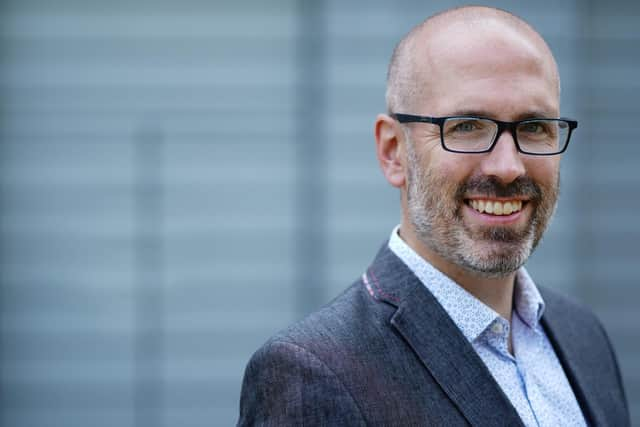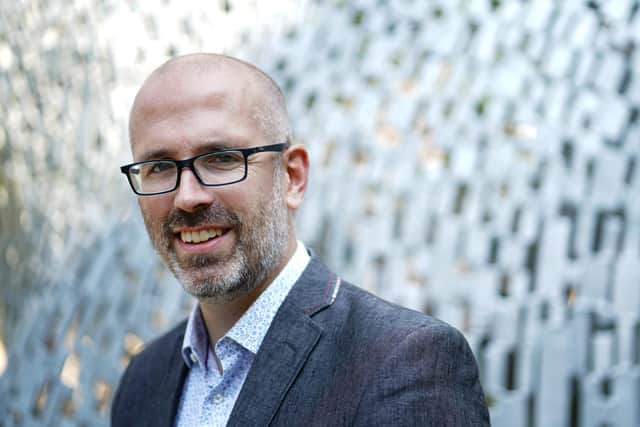The Big Interview: Eos Advisory managing partner Andrew McNeill
The executive, who has a PhD in molecular physics from the University of Leeds, was part of the founding team at Ambicare Health, a medical device company in the oncology space, for example, and was later chief executive of biotechnology company Fixed Phage before joining Eos in 2017.
The firm – whose top team includes record-breaking cyclist Mark Beaumont – was formed in 2014, and invests in four key impact areas: disease diagnosis, prevention and treatment; energy security, climate change and pollution; food and water security; and sustainability of industrial processes and infrastructure.
Advertisement
Hide AdAdvertisement
Hide AdLast week it announced that it had added the 14th investee company to its portfolio, leading a £1.2 million round in Wobble Genomics – the first investment from the newly raised Eos EIS Innovation Fund, which invests alongside the Eos Syndicate. Eos is also actively building a venture partnership model, Eos Venture Partnership, and in February announced its first tie-up, with US-based Kineticos.


Can you explain what your role involves?
My role is very broad. I spend a lot of time working with scientists and engineers who are starting companies, to make sure that we fully understand what they do and how they might impact the world. Having a scientific background helps enormously when looking at technologies in fields as diverse as genomics or microfluidics. Deciding which companies we should invest in is fundamental to the role.
There is another key element to this process, which is psychology. It is the team who will deliver success. I spend a lot of time with the founders and management, appraising the team as a whole.
Once we have decided to invest, the next part of my role is structuring and valuing the deal. Although there is a great deal of similarity across early-stage equity investments, there are always key differences. All of our investments are knowledge-intensive businesses, as opposed to consumer brands.


Therefore, working out the route to market and capital journey can be complicated, so having an appropriate valuation for the company at seed stage is crucial.
For Eos, the conclusion of the investment deal is not the end of the journey, it is just the start. We are geared up to support our companies after the investment and help them grow. For me, another key part of my role is in supporting the portfolio; this might be working with them at board level, making introductions or helping shape strategy.
The final part of my role is in working with our investors. Eos sources its funds from a variety of sources, but ultimately there is a range of people, not just in Scotland but around the world who share our values and trust in Eos to make the right investment decisions. A key part of my role therefore is spending time with these investors, in understanding what they wish to do, and building relationships.
A final thought on my role, which also relates to the entire team at Eos Advisory – we all wish to use our time in making the world a better place. We do not see that there is any divergence in making investments that have both a positive impact in the world and also provide excellent commercial returns.
Advertisement
Hide AdAdvertisement
Hide AdThe firm earlier this year described the previous 12 months as “transformational” despite coinciding with the pandemic. Can you give more details on how you have navigated this period, and how Covid-19 has shone a light on the role of science in society?
It is quite notable that over the last 12 to 18 months or so Eos has really picked up momentum on multiple fronts. We have built out our team, the amount that we have invested has increased significantly, and several companies within the portfolio have seen major advancements.
Seed-stage investments often at the point of incorporation are not usually revenue-generating, and so we invest in them in the knowledge that it may take some time to reach sales and even longer to reach profitability.
It is clear that Covid-19 has had a significant impact on how the general population sees science, and this has directly carried through in a significant way to interest of investors. As a scientist I have always believed in the ability of science to shape our world in a positive way – and it is now much easier to have that conversation with investors in a way that wasn’t as present before the pandemic.
Eos is aiming over the next year to scale its investments and support for early-stage companies and has three investment pillars in place: the Eos Syndicate, Eos Innovation Fund, and Eos Venture Partnerships. What is your outlook for Eos for the next 12 months and what kind of pipeline of opportunities does it have?
Eos focuses its investments into early-stage ventures, and then only when the company is targeting a problem that has a global perspective. We have spent considerable time developing a strategy to support our companies over the longer term.
We originally started out as an angel syndicate in St Andrews, and this has now grown into a thriving community of individuals. About three years ago we decided to launch the Eos Innovation Fund that sits alongside the syndicate and co-invests with them.
Philosophically, we have always looked to co-invest alongside others, and for each £1 that our syndicate has invested into the portfolio, we have co-invested another £5 alongside others.
Advertisement
Hide AdAdvertisement
Hide AdOver the last 18 months we have looked to formalise this model of co-investment and have created what we call Venture Partnerships. These are investors from around the world who are prepared to invest in early-stage Scottish businesses in deals led by Eos.
You’ve highlighted the challenge of commercialisation to truly showcase Scotland’s innovation on a global stage. How can Eos help tackle this and what can be done more broadly?
Scotland has historically been excellent at science, invention, and innovation, but perhaps less successful at commercialising these ideas. We believe there are many reasons for this, but mainly a lack of both access to capital and commercialisation experience.
At Eos, we are already doing our bit to address the access to capital with the Syndicate, Fund and Venture Partnerships. But we are also expanding the concept of venture partnership to build an ecosystem of individuals and companies who have the skills and experience to support the commercialisation and growth of these companies. And this network is global.
You have a scientific background; how do you harness this in your work at Eos?
I started my career as a research scientist working in a physics lab. We were working with plastic electronics, items that looked like credit cards and emitted light, in a collaboration with the dermatology department at the local hospital. The dermatologists there were using large immobile lasers to treat skin cancer, but we created wearable light-emitting sticking plasters to treat the disease, and it worked!
A business was started, and we raised venture capital from an investor in London. I learnt a huge amount with this company.
After that, I moved to a chief scientific role in another early-stage science company. I was able to use the skills I had obtained in translating early-stage research, but this time in a managerial and leadership role.
Advertisement
Hide AdAdvertisement
Hide AdFollowing this I moved into a chief executive role at a biotech company. Around this time, I met Kevin Grainger who had founded the Eos Investment Syndicate in St Andrews. We shared a love of science and a belief that it could be commercialised to have a positive impact in the world. I knew my way around an investment deal so appreciated both sides – founders and investors.
Who do you admire in business?
I am constantly amazed by and admire the entrepreneurs who have the guts to step outside of what they are doing and start companies.
The firm has made some high-profile appointments such as Chris Brinsmead and Mark Beaumont. To what extent are these strengthening your offering?
They have vastly different backgrounds, which epitomises the diversity of experience with our entire board. One was chairman of a multinational pharmaceutical company and the other an athlete who had the determination to break world records time and again. Such diversity of opinion fundamentally improves the quality of our decision-making.
The most important part of the investing we do at Eos is making good decisions; the decision to back the science, the decision to invest in a founding team. Both Mark and Chris are deep thinkers, and they use that skill to help us make the right decisions on investments.
A message from the Editor:
Thank you for reading this article. We're more reliant on your support than ever as the shift in consumer habits brought about by coronavirus impacts our advertisers.
If you haven't already, please consider supporting our trusted, fact-checked journalism by taking out a digital subscription.
Comments
Want to join the conversation? Please or to comment on this article.
